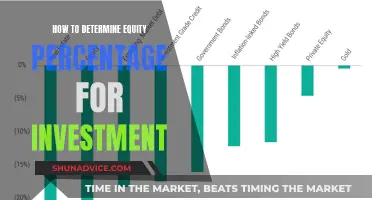
Global equity investments are an essential way to diversify investment portfolios. They provide opportunities to invest in companies located anywhere in the world, including the investor's own country. Global equity funds seek to identify the best investments from a wide range of securities, and they can be focused on a single asset class or allocated to multiple asset classes. These funds can be actively or passively managed and are designed to provide investors with a diversified portfolio of global investments, allowing them to participate in the growth of different economies and industries.
| Characteristics | Values |
|---|---|
| Definition | Global equity funds buy stocks domestically and around the world |
| Investment Regions | Developed markets, emerging markets, and frontier markets |
| Investment Type | Single asset class or multiple asset classes |
| Investment Objective | Long-term growth of capital through investments in common stocks |
| Risk Mitigation | Diversified portfolio of global investments |
| Opportunities | Greater returns, exposure to unique growth opportunities in different economies and sectors |
| Fund Types | Closed-end mutual funds, open-end mutual funds, or exchange-traded funds (ETF) |
What You'll Learn
- Global funds: investing in companies worldwide, including your own country
- Diversifying investment portfolios: balancing risk and potential returns
- Global equity funds: buying stocks domestically and internationally
- Actively managed global funds: a popular choice for investors
- Global debt funds: investing in US and non-US fixed-income securities

Global funds: investing in companies worldwide, including your own country
Global funds are a type of mutual fund or ETF (exchange-traded fund) that invests in companies located anywhere in the world, including the investor's own country. They seek to identify the best investments from a global universe of securities, with the goal of providing investors with a diversified portfolio of international investments.
By investing in companies across different countries and regions, global funds offer several benefits to investors. Firstly, they provide access to a wider range of investment opportunities, allowing investors to tap into the growth of different economies and industries. This diversification of investments can also help to mitigate risks and maximise returns. For example, investing in emerging markets can offer greater opportunities for higher returns, while developed markets with mature economies and efficient infrastructures may pose lower risks.
Global funds can be focused on a single asset class or allocated to multiple asset classes. They can be offered as closed-end mutual funds, open-end mutual funds, or ETFs. Actively managed global funds are a popular choice for investors, but passively managed index funds can also provide broad market exposure with the benefits of diversification.
When investing in global funds, investors can choose to invest in both global debt and equity funds or hybrid funds, which invest in a combination of these asset classes. This allows investors to further manage risk while attempting to generate higher returns.
Global equity funds, in particular, buy stocks domestically and internationally and can be guided by various philosophies, allocation strategies, and management styles. They provide investors with the opportunity to participate in the long-term rising trend of global markets and benefit from diverse economic dynamics and innovations worldwide.
Becoming a Financial Investment Manager: Key Steps
You may want to see also

Diversifying investment portfolios: balancing risk and potential returns
Global equity investments are an essential component of diversifying investment portfolios. They provide access to a wide range of companies and markets worldwide, reducing the risk associated with focusing on a single market or region. By investing in global equities, investors can tap into diverse economic dynamics and industries, balancing risk and potential returns.
Global funds, for instance, invest in securities from various countries and regions, including developed, emerging, and frontier markets. These funds can be actively or passively managed and may focus on a single asset class or multiple asset classes. Actively managed global funds are a popular choice for investors due to their potential for higher returns, while passively managed index funds offer broad market exposure with diversification benefits.
To further enhance diversification and balance risk, investors can opt for both global debt and equity funds or hybrid funds. This strategy allows investors to access a broader range of investment opportunities while managing their exposure to different types of assets. Additionally, global equity funds provide hundreds of combinations of guiding philosophies, allocation strategies, and management styles to choose from.
When investing in global equities, it is essential to consider the long-term nature of these investments. Patience is key, as market dynamics can shift over time. Beginning with a focus on diversification and adopting a long-term investment horizon is generally recommended for newcomers to global equity investing.
By diversifying their portfolios with global equity investments, investors can access unique growth opportunities, participate in the rising trend of global markets, and benefit from the resilience that comes with investing in diverse economic and industry sectors worldwide.
Investment Giants: World's Largest Corporations in Investment Management
You may want to see also

Global equity funds: buying stocks domestically and internationally
Global equity funds are a type of mutual fund or ETF (exchange-traded fund) that invests in companies located anywhere in the world, including the investor's own country. These funds seek to identify the best investments across a diverse range of global securities, with the goal of providing investors with a well-rounded portfolio.
Global equity funds can be an attractive option for those seeking to expand their investment horizons beyond their domestic market. By investing in both domestic and international stocks, these funds offer a broader range of opportunities and the potential for higher returns. Investing in international securities, however, also comes with additional risks that investors should be aware of.
One of the key benefits of global equity funds is the diversification they offer. By spreading investments across multiple countries and regions, investors can reduce their exposure to specific country or market risks. This diversification can help to mitigate some of the risks associated with investing solely in one's domestic market, providing a more balanced portfolio.
Global equity funds can invest in companies across different categories of investment regions, including developed, emerging, and frontier markets. Developed markets are those with mature economies and efficient financial market infrastructures. Emerging markets, including some of the world's largest and fastest-growing economies, often provide greater opportunities for high returns. Meanwhile, frontier markets, as the least developed, come with the highest risk but can also offer unique investment prospects.
When investing in global equity funds, investors have several options to choose from. These funds can be actively or passively managed and may focus on a single asset class or be allocated to multiple asset classes. Actively managed global funds are a popular choice, but passively managed index funds can also provide broad market exposure along with the benefits of diversification.
Invest India: Adding Value with Innovation and Expertise
You may want to see also

Actively managed global funds: a popular choice for investors
Global funds are a type of mutual fund or ETF that invests in companies located anywhere in the world, including the investor's own country. They seek to identify the best investments from a global universe of securities. Actively managed global funds are a popular choice for investors.
Actively managed funds try to beat market returns with investments hand-picked by professional money managers. They use the portfolio manager's deep research and expertise to hand-select stocks or bonds for the fund. Over the past 10 years, 89% of Vanguard's actively managed funds performed better than their peer-group averages.
Actively managed funds can add value to an investor's portfolio because they offer an opportunity for outperformance. However, it is important to be mindful that there is also the possibility that they may underperform. For example, over the past 15 years, only about 50% of active stock fund managers and active bond fund managers have outperformed their designated benchmarks.
Fidelity, for example, has a history of demonstrating that active management has worked for more than 70 years. Their skilled portfolio managers delve into research from their team of global analysts to identify undervalued stocks and work to help produce better returns than those of index funds to help enhance their clients' portfolios.
Actively managed global funds can be a popular choice for investors because they provide a leading investment option. Their diversified investments can mitigate risk and also allow for the identification of top-performing investments.
Strategies to Overcome Investment Portfolio Challenges
You may want to see also

Global debt funds: investing in US and non-US fixed-income securities
Global equity investments refer to funds that invest in companies located anywhere in the world, including the investor's own country. These funds seek to identify the best investments from a global universe of securities and can be passively managed. They can be focused on a single asset class or allocated to multiple asset classes.
Now, global debt funds, which fall under the fixed-income asset category, are investment pools that primarily contain fixed-income investments. These funds may invest in short-term or long-term bonds, securitized products, money market instruments, or floating-rate debt. The fees associated with these funds are typically lower than those for equity funds due to reduced management costs.
Global debt funds provide investors with a diversified portfolio of international fixed-income securities. These funds may focus on U.S. government debt, considered the lowest risk, or corporate debt, whose risk profile is generally determined by the issuing company's credit rating. Investment-grade debt is issued by stable, high-credit-quality companies, while high-yield debt is associated with lower-credit-quality companies and higher risk.
Some well-known global debt funds include the Vanguard Total International Bond Index Fund (VTABX) and the PIMCO International Bond Fund (PFORX). These funds invest in various portfolios of U.S. and non-U.S. fixed-income securities, offering investors a range of options to suit their needs.
Fixed-income securities provide a fixed interest or dividend payment until maturity, when investors are repaid their principal amount. They are considered to have lower returns and lower risks compared to stocks. Examples of fixed-income products include treasury bonds, municipal bonds, corporate bonds, and certificates of deposit (CDs).
UK Equities: A Beginner's Guide to Getting Started
You may want to see also
Frequently asked questions
A global equity fund is a mutual fund or ETF that invests in companies located anywhere in the world, including the investor's own country.
Global equity funds provide investors with a diversified portfolio of global investments, which can increase an investor's potential returns. They also allow investors to diversify their investment risk across global markets and access unique growth opportunities in different economies and sectors.
Investing in global securities can increase risks due to international volatility and varying economic landscapes.
Some examples of major funds in the large-cap global equity space include the American Funds New Perspective Fund (ANWPX) and the First Eagle Global Fund (SGENX).







